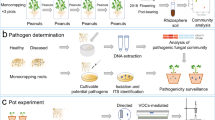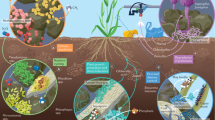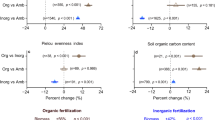Abstract
THE arable land available in Hong Kong is very limited and farming is so intensive that the annual production of 8–9 vegetable crops, often on the same land, is common. For many reasons, especially from an accumulation of soil-borne pathogens, this might be expected to have a deleterious effect on the soil.
This is a preview of subscription content, access via your institution
Access options
Subscribe to this journal
Receive 51 print issues and online access
$199.00 per year
only $3.90 per issue
Buy this article
- Purchase on Springer Link
- Instant access to full article PDF
Prices may be subject to local taxes which are calculated during checkout
Similar content being viewed by others
References
Chu, Myra, and Stephen, R. C. (in preparation).
Warcup, J. H., Nature, 166, 117 (1950).
Papavizas, G. C., and Davey, C. B., Phytopath., 52, 834 (1960).
Author information
Authors and Affiliations
Rights and permissions
About this article
Cite this article
CHU, M. Incidence of Rhizoctonia in a Cultivated and a Fallow Soil in Hong Kong. Nature 211, 862–863 (1966). https://doi.org/10.1038/211862b0
Issue Date:
DOI: https://doi.org/10.1038/211862b0
Comments
By submitting a comment you agree to abide by our Terms and Community Guidelines. If you find something abusive or that does not comply with our terms or guidelines please flag it as inappropriate.



